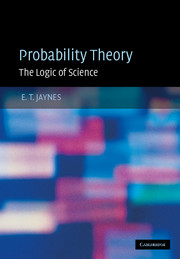Book contents
- Frontmatter
- Contents
- Editor's foreword
- Preface
- Part I Principles and elementary applications
- Part II Advanced applications
- 11 Discrete prior probabilities: the entropy principle
- 12 Ignorance priors and transformation groups
- 13 Decision theory, historical background
- 14 Simple applications of decision theory
- 15 Paradoxes of probability theory
- 16 Orthodox methods: historical background
- 17 Principles and pathology of orthodox statistics
- 18 The Ap distribution and rule of succession
- 19 Physical measurements
- 20 Model comparison
- 21 Outliers and robustness
- 22 Introduction to communication theory
- Appendix A Other approaches to probability theory
- Appendix B Mathematical formalities and style
- Appendix C Convolutions and cumulants
- References
- Bibliography
- Author index
- Subject index
16 - Orthodox methods: historical background
from Part II - Advanced applications
Published online by Cambridge University Press: 05 September 2012
- Frontmatter
- Contents
- Editor's foreword
- Preface
- Part I Principles and elementary applications
- Part II Advanced applications
- 11 Discrete prior probabilities: the entropy principle
- 12 Ignorance priors and transformation groups
- 13 Decision theory, historical background
- 14 Simple applications of decision theory
- 15 Paradoxes of probability theory
- 16 Orthodox methods: historical background
- 17 Principles and pathology of orthodox statistics
- 18 The Ap distribution and rule of succession
- 19 Physical measurements
- 20 Model comparison
- 21 Outliers and robustness
- 22 Introduction to communication theory
- Appendix A Other approaches to probability theory
- Appendix B Mathematical formalities and style
- Appendix C Convolutions and cumulants
- References
- Bibliography
- Author index
- Subject index
Summary
With all this confounded trafficking in hypotheses about invisible connections with all manner of inconceivable properties, which have checked progress for so many years, I believe it to be most important to open people's eyes to the number of superfluous hypotheses they are making, and would rather exaggerate the opposite view, if need be, than proceed along these false lines.
H. von Helmholtz (1868)This chapter and Chapter 13 are concerned with the history of the subject rather than its present status. There is a complex and fascinating history before 1900, recounted by Stigler (1986c), but we are concerned now with more recent developments. In the period from about 1900 to 1970, one school of thought dominated the field so completely that it has come to be called ‘orthodox statistics’. It is necessary for us to understand it, because it is what most working statisticians active today were taught, and its ideas are still being taught, and advocated vigorously, in many textbooks and universities.
In Chapter 17 we want to examine the ‘orthodox’ statistical practice thus developed and compare its technical performance with that of the ‘probability as logic’ approach expounded here. But first, to understand this weird course of events, we need to know something about the problems faced then, the sociology that evolved to deal with them, the roles and personalities of the principal figures, and the general attitude toward scientific inference that orthodoxy represents.
Information
- Type
- Chapter
- Information
- Probability TheoryThe Logic of Science, pp. 490 - 508Publisher: Cambridge University PressPrint publication year: 2003
